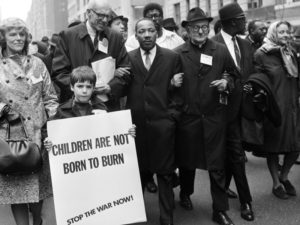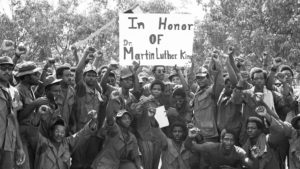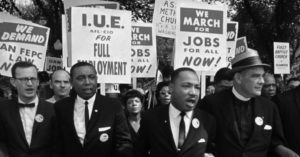
As we celebrate Martin Luther King Jr. Day we will hear and see a whitewashed version of the life and works of Dr. King. We will be bombarded with the narrative that King was the peaceful negro who had a dream, a watered down activist who got equality for his people by leading a march. We will be told that his dream has become a reality. That King’s Civil Rights Movement was successful and so now we have a day off from work. We must be wary of narratives that portray Dr. King in this light.
We must look back to the things that King was fighting for, particularly in the years before he was assassinated, to get a better picture of the radical spirit that was emerging. MLK Jr. was not just a leader, he was a product of the struggle. A man whose stance and methods of struggle were in the process of evolving. King was awakening to the destructive effects of the US war machine and how war was not only being waged against the Vietnamese but also against workers and oppressed people right here in America.

In April 1967 at Riverside Church, King spoke boldly against the imperialist war on Vietnam: “When I first decided to take a firm stand against the war in Vietnam, I was subjected to the most bitter criticism, by the press, by individuals, and even by some fellow civil rights leaders. There were those who said that I should stay in my place, that I was a civil rights leader and that these two issues did not mix, and I should stick with civil rights. Well, I had only one answer for that and it was simply the fact that I have struggled too long and too hard now to get rid of segregation in public accommodations to end up at this point in my life segregating my moral concerns. Injustice anywhere is a threat to justice everywhere.”
Dr. King also fought alongside the Memphis sanitation workers as they demanded better wages, safer working conditions, and freedom from racial discrimination. King supported the strike of the workers, marching defiantly through the militarized streets of Memphis. King knew that if we did not fight for workers against the Capitalist Class structure, that true freedom was not won. He knew that the battle must be waged until every worker had access to housing, a good job, and a government devoted to the betterment of its citizens and not trumped up democracy used to justify imperialist wars! That we who believe in true freedom cannot rest until we win the Workers Struggle.
On this day we the working class salute Dr. Martin Luther King for his commitment to fight for workers’ rights. We lift up King’s name and recognize his deeds as an example of how we must fight the evils of racism, economic injustice, and imperialist war. We must all wage relentless struggle until our collective dream of freedom is realized.

Read here a collection of his words:
“There are three major social evils . . . the evil of war, the evil of economic injustice, and the evil of racial injustice.”
“When machines and computers, profit motives and property rights are considered more important than people, the giant triplets of racism, materialism, and militarism are incapable of being conquered.”
“When I first decided to take a firm stand against the war in Vietnam, I was subjected to the most bitter criticism, by the press, by individuals, and even by some fellow civil rights leaders. There were those who said that I should stay in my place, that I was a civil rights leader and that these two issues did not mix and I should stick with civil rights. Well, I had only one answer for that and it was simply the fact that I have struggled too long and too hard now to get rid of segregation in public accommodations to end up at this point in my life segregating my moral concerns. And I made it very clear that I recognized that justice was indivisible. Injustice anywhere is a threat to justice everywhere. ”
“It is disgraceful that a Congress that can vote upward of $35 billion a year for a senseless, immoral war in Vietnam cannot vote a weak $2 billion dollars to carry on our all-too-feeble efforts to bind up the wound of our nation’s 35 million poor. This is nothing short of a Congress engaging in political guerrilla warfare against the defenseless poor of our nation.”
“The users of naval guns, millions of tons of bombs, and revolting napalm cannot speak to Negroes about violence. Only those who are fighting for peace have the moral authority to lecture on nonviolence.”
“A nation that continues year after year to spend more money on military defense than on programs of social uplift is approaching spiritual death.”
“All over the globe men are revolting against old systems of exploitation and oppression and out of the wombs of a frail world new systems of justice and equality are being born. The shirtless and barefoot people of the land are rising up as never before. “The people who sat in darkness have seen a great light.” We in the West must support these revolutions.”
“A true revolution of values will soon look uneasily on the glaring contrast of poverty and wealth. With righteous indignation, it will look across the seas and see individual capitalists of the West investing huge sums of money in Asia, Africa and South America, only to take the profits out with no concern for the social betterment of the countries, and say: “This is not just.” It will look at our alliance with the landed gentry of Latin America and say: “This is not just.” The Western arrogance of feeling that it has everything to teach others and nothing to learn from them is not just.”
“The fact is that freedom is never voluntarily given by the oppressor. It must be demanded by the oppressed—that’s the long, sometimes tragic and turbulent story of history. And if people who are enslaved sit around and feel that freedom is some kind of lavish dish that will be passed out on a silver platter by the federal government or by the white man while the Negro merely furnishes the appetite, he will never get his freedom. ”
“We can all get more together than we can apart; we can get more organized together than we can apart. And this is the way we gain power. Power is the ability to achieve purpose, power is the ability to affect change, and we need power. What is power? Walter Reuther said once that “power is the ability of a labor union like UAW to make the most powerful corporation in the world—General Motors—say yes when it wants to say no.” That’s power. And I want you to stick it out so that you will be able to make Mayor Loeb and others say yes, even when they want to say no.”
“Whenever you are engaged in work that serves humanity and is for the building of humanity, it has dignity, and it has worth. One day our society must come to see this. One day our society will come to respect the sanitation worker if it is to survive, for the person who picks up our garbage, in the final analysis, is as significant as the physician, for if he doesn’t do his job, diseases are rampant. All labor has dignity. ”
“Now our struggle is for genuine equality, which means economic equality. For we know now that it isn’t enough to integrate lunch counters. What does it profit a man to be able to eat at an integrated lunch counter if he doesn’t earn enough money to buy a hamburger and a cup of coffee?”
“We look around and we see thousands and millions of people making inadequate wages every day. Not only do they work in our hospitals, they work in our hotels, they work in our laundries, they work in domestic service, and they find themselves underemployed. You see, no labor is really menial unless you’re not getting adequate wages. People are always talking about menial labor. But if you’re getting a good wage . . . that isn’t menial labor. What makes it menial is the income, the wages. ”
“I do not come to you as a prophet of doom; I come to you as one who has accepted the challenge of our urban ghettos. This is a more difficult challenge than the one we face in the South, for we will not be dealing with constitutional rights; we will be dealing with fundamental human rights. It is a constitutional right for a man to be able to vote, but the human right to a decent house is as categorically imperative and morally absolute as was that constitutional right. It is not a constitutional right that men have jobs, but it is a human right.”
“It is a bitter and ironic truth that in today’s prosperity, millions of Negroes live in conditions identical with or worse than the Depression thirties. For hundreds of thousands there is no unemployment insurance, no social security, no Medicare, no minimum wage. The laws do not cover their form of employment. For millions of others, there is no employment or under-employment. In some ghettos, the present rate of unemployment is higher than that of the thirties. Education for our children is second class, and in the higher levels, so limited it has no significance as a lever for uplift. The tenements we inhabited thirty years ago, which were old then, are three decades more dilapidated. Discrimination still smothers initiative, and humiliates the daily life of young and old. The progress of the nation has not carried the Negro with it; it has favored a few and bypassed the millions.”
“Do you know that most of the poor people in our country are working every day? And they are making wages so low that they cannot begin to function in the mainstream of the economic life of our nation.”
“…it is criminal to have people working on a full-time basis and a full-time job getting part-time income.”
“Some of us who have already begun to break the silence of the night have found that the calling to speak is often a vocation of agony, but we must speak. We must speak with all the humility that is appropriate to our limited vision, but we must speak…”
“I knew that I could never again raise my voice against the violence of the oppressed in the ghettos without having first spoken clearly to the greatest purveyor of violence in the world today — my own government. For the sake of those boys, for the sake of this government, for the sake of hundreds of thousands trembling under our violence, I cannot be silent.”
